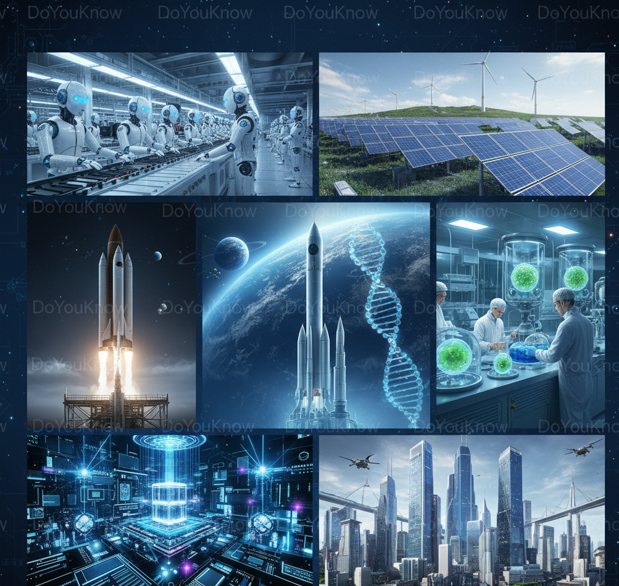Do You Know Which New Industries Could Make Trillions in the Next Decade
Explore the emerging industries poised to generate trillions of dollars in the next decade. From artificial intelligence and space exploration to green energy, biotechnology, and advanced robotics, discover the future sectors shaping the global economy and investment landscape.
BUSINESS & ECONOMY
Do You Know Team
9/28/20256 min read


The next decade promises an economic revolution unlike anything seen in recent history. As technology advances, consumer behavior shifts, and global challenges demand innovative solutions, entirely new industries are emerging that could generate trillions of dollars in wealth. Investors, governments, and entrepreneurs are closely watching these sectors, recognizing that they represent the future of economic growth and societal transformation.
Understanding which industries will dominate the coming decade requires examining trends in technology, demographics, energy, healthcare, and global infrastructure. These sectors are not merely extensions of existing industries—they are new ecosystems driven by innovation, disruptive technologies, and unmet societal needs.
In this article, we explore the most promising emerging industries projected to generate trillions in revenue over the next ten years. We analyze their growth potential, global impact, technological drivers, and investment opportunities, providing a comprehensive roadmap to the economic future.
Artificial Intelligence and Machine Learning
Artificial intelligence (AI) is transforming nearly every industry, from healthcare to finance, logistics, and entertainment. AI systems capable of learning, adapting, and optimizing complex processes are creating new economic opportunities previously unimaginable.
AI-Driven Automation:
Automation powered by AI is replacing repetitive, labor-intensive tasks across industries. Robotics in manufacturing, AI-powered logistics, and intelligent supply chain management increase efficiency, reduce costs, and generate enormous economic value. Companies that integrate AI-driven solutions gain competitive advantages, and the sector as a whole is projected to contribute trillions to the global economy.
Healthcare and AI Diagnostics:
AI applications in healthcare, including predictive analytics, diagnostic imaging, and personalized medicine, are poised to revolutionize patient care. AI algorithms can detect diseases at earlier stages, optimize treatment plans, and predict epidemic outbreaks, potentially saving billions in healthcare costs while generating significant economic value.
Financial Technology (FinTech) AI:
AI-powered financial tools, including algorithmic trading, fraud detection, and automated advisory services, are transforming banking and investment landscapes. As AI models become increasingly sophisticated, they will drive trillions in financial activity and reshape how wealth is created and managed.
AI Ethics and Regulation:
As AI grows, new industries around AI governance, ethics, and compliance are emerging. Companies specializing in AI auditing, transparency, and regulation will become essential players in the global economy, creating high-value niches and new revenue streams.
Space Exploration and Commercialization
Once the domain of governments alone, space is now a rapidly emerging commercial frontier. Companies investing in satellite technology, space tourism, asteroid mining, and orbital infrastructure could see unprecedented returns.
Satellite Internet and Communication Networks:
The deployment of mega-constellations of satellites is expanding global internet access. Companies like SpaceX’s Starlink are creating entirely new markets in high-speed, low-latency connectivity, particularly in regions previously underserved by traditional infrastructure.
Space Tourism:
Although in its infancy, commercial space tourism is rapidly developing. Companies are planning orbital flights, suborbital experiences, and even lunar tourism. As the market matures and costs decrease, this industry could generate billions annually, eventually scaling into a trillion-dollar ecosystem.
Resource Extraction and Asteroid Mining:
Asteroids are rich in metals, rare earth elements, and water—resources critical to technology, energy, and space infrastructure. Mining these celestial bodies could create a multi-trillion-dollar industry, providing resources for Earth and future space colonization.
Orbital Manufacturing and Research:
Microgravity environments enable unique manufacturing processes and scientific research. Pharmaceutical compounds, advanced materials, and new technologies developed in orbit may lead to high-value products and create a space-based economy.
Green Energy and Sustainable Technologies
The global transition to sustainable energy is creating industries capable of reshaping economies while addressing climate change. Governments, investors, and corporations are channeling trillions into renewable energy, energy storage, and sustainable infrastructure.
Solar and Wind Energy:
Technological advancements are dramatically reducing the cost of solar panels and wind turbines. Large-scale deployment of renewable energy projects is creating massive revenue streams and employment opportunities, with countries transitioning away from fossil fuels.
Energy Storage and Battery Technology:
The rise of electric vehicles (EVs) and renewable energy storage solutions has sparked a boom in battery technology. Companies developing high-capacity, long-life, and environmentally sustainable batteries are positioned to dominate a trillion-dollar market.
Hydrogen Economy:
Green hydrogen production and fuel cell technology are emerging as critical components of sustainable energy. Hydrogen can replace fossil fuels in industrial processes, transportation, and energy storage, creating new trillion-dollar industrial ecosystems.
Carbon Capture and Climate Solutions:
Technologies that remove CO2 from the atmosphere and reduce greenhouse gas emissions are attracting significant investments. Carbon capture, utilization, and storage (CCUS) solutions are creating new industries that may soon rival traditional energy sectors in economic scale.
Biotechnology and Life Sciences
Advances in biotechnology, genomics, and personalized medicine are transforming healthcare and agriculture, creating industries with enormous economic potential.
Genetic Engineering and Gene Therapy:
Gene editing technologies like CRISPR are revolutionizing medicine. Personalized therapies for rare diseases, cancer treatments, and genetically optimized crops are opening trillion-dollar markets in healthcare and agriculture.
Synthetic Biology:
Synthetic biology enables the creation of custom organisms, biofuels, and industrial chemicals. Companies specializing in synthetic life forms, lab-grown meat, and bio-manufacturing are poised to become multi-trillion-dollar players.
Healthcare AI and Diagnostics:
AI-driven diagnostics, predictive analytics, and wearable health technology are revolutionizing patient care. Integration with biotechnology accelerates drug discovery, clinical trials, and personalized medicine, producing vast economic value.
Longevity and Anti-Aging Technologies:
Emerging industries focused on extending human lifespan through biotechnology, regenerative medicine, and personalized nutrition have enormous market potential. As global populations age, demand for longevity solutions is projected to skyrocket.
Advanced Robotics and Automation
Robotics is no longer confined to assembly lines; advanced robotics and autonomous systems are transforming industries from healthcare to logistics, agriculture, and defense.
Industrial Automation:
Robots capable of handling complex tasks, self-optimization, and adaptive learning are increasing productivity in manufacturing, reducing labor costs, and generating billions in value globally.
Service and Domestic Robotics:
Robotic assistants, automated delivery systems, and intelligent household devices are rapidly becoming mainstream. As adoption grows, this sector could scale into a trillion-dollar global market.
Autonomous Transportation:
Self-driving vehicles, drones, and autonomous ships are revolutionizing logistics, delivery, and transportation. Companies developing autonomous technologies are projected to dominate multi-trillion-dollar supply chains in the next decade.
Virtual Reality, Augmented Reality, and the Metaverse
Digital transformation is creating entirely new industries centered around immersive experiences, entertainment, and digital commerce.
Virtual Worlds and Gaming:
The gaming industry, augmented by VR and AR technologies, is expanding into immersive experiences, esports, and digital social platforms. Users spend billions annually, and this trend is projected to grow exponentially.
Metaverse and Digital Economies:
Virtual marketplaces, digital real estate, and tokenized economies within the metaverse are creating new revenue streams. Companies offering tools, platforms, and content for virtual worlds are entering trillion-dollar growth opportunities.
Training, Education, and Healthcare Applications:
VR and AR technologies are increasingly applied in education, medical training, and therapeutic interventions, creating industries that combine technology with societal value.
Space-Based Technologies and Infrastructure
Beyond exploration, space infrastructure is poised to generate significant economic value:
Satellite-Based Services: GPS, communications, Earth observation, and remote sensing.
Space Manufacturing: Microgravity manufacturing of pharmaceuticals, materials, and semiconductors.
Orbital Logistics and Construction: Infrastructure to support satellites, stations, and future habitats.
These sectors, combined with investment from governments and private companies, are projected to create multi-trillion-dollar markets.
Quantum Computing and Next-Generation Technology
Quantum computing promises exponential increases in computational power, transforming industries from finance to pharmaceuticals.
Drug Discovery: Simulating molecular interactions for faster, more accurate drug development.
Financial Modeling: Optimizing portfolios, predicting market trends, and reducing risk.
Cybersecurity: Developing next-generation encryption and defensive strategies.
Quantum technologies, including sensors and networks, could become essential components of global infrastructure, creating enormous economic opportunities.
Ethical, Regulatory, and Investment Considerations
As these emerging industries grow, they present unique challenges:
Ethics and Governance: AI, biotechnology, and autonomous systems require regulatory oversight to prevent misuse.
Global Competition: Nations and corporations are competing for dominance in trillion-dollar sectors.
Investment Opportunities: Venture capital, private equity, and government funding will accelerate growth in these industries.
The combination of technological innovation, societal need, and global investment ensures that the next decade will see unprecedented wealth creation in these sectors.
FAQ – Frequently Asked Questions
Q1: Which industries are most likely to make trillions in the next decade?
A1: Artificial intelligence, space commercialization, green energy, biotechnology, advanced robotics, quantum computing, and immersive digital experiences.
Q2: How can investors participate in these industries?
A2: Through venture capital, technology funds, ETFs, and direct investment in emerging companies driving innovation.
Q3: Are these industries accessible globally?
A3: Yes. While some technologies are concentrated in developed nations, global collaboration and digital adoption enable worldwide participation.
Q4: What are the biggest risks?
A4: Regulatory challenges, technological failures, cybersecurity risks, and global geopolitical tensions may affect growth.
Q5: How will these industries impact society?
A5: They will create jobs, enhance quality of life, improve healthcare, enable sustainable energy, and redefine global commerce.
Conclusion
The next decade will witness economic transformation on a scale never seen before. Industries emerging from artificial intelligence, space exploration, green energy, biotechnology, advanced robotics, and digital ecosystems are poised to generate trillions of dollars.
These sectors will reshape employment, investment, global trade, and everyday life. Early adopters, entrepreneurs, and investors stand to benefit immensely, while societies that embrace technological innovation and sustainable development will thrive.
Understanding these industries, their drivers, and potential pitfalls is essential for anyone looking to navigate the future economic landscape. From smart machines to interstellar exploration, the world’s next trillion-dollar industries are already taking shape—offering unprecedented opportunities for innovation, wealth creation, and global progress.
#TrillionDollarIndustries #EmergingMarkets #FutureEconomy #AI #SpaceExploration #GreenEnergy #Biotechnology #AdvancedRobotics #Metaverse #QuantumComputing #DoYouKnow #GlobalInvestments #NextDecadeOpportunities #DigitalTransformation #FutureTrends
Knowledge
Empowering minds with reliable educational content daily.
Newsletter Signup
© 2025 DoYouKnow. All rights reserved.
Stay Ahead of the Trends – Join Our Newsletter
